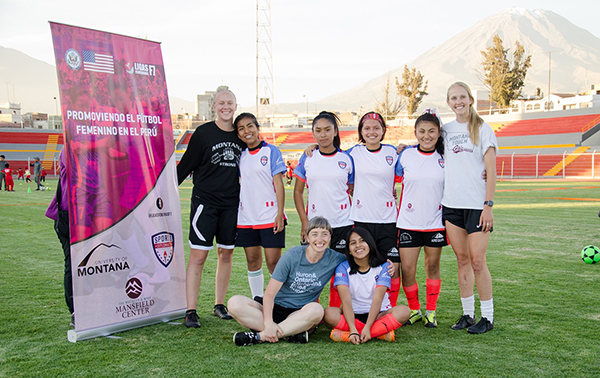Student Earns UM’s First Doctorate in Public Health
Maja Pedersen’s favorite symbol of social connectedness is a soccer team. Having played soccer in Alaska, Norway and Missoula, she knows firsthand how connecting with others on a team builds self-worth and health.
Now, she will continue her research revolving around social connectedness, health and physical activity as the University of Montana’s first Ph.D. graduate in public health, off to Stanford on a prestigious National Cancer Institute fellowship.
Focused on community-based approaches to disease prevention and health promotion, Pedersen’s research is especially important for underserved and aging populations, said UM Professor Kari Harris in the School of Public and Community Health Sciences.
“As the U.S. population ages, Maja’s innovative work is becoming even more significant in promoting health, especially among our most vulnerable populations,” Harris said.
Pedersen, from Fairbanks, Alaska, came to UM in 2010 as a community health master’s student. Before UM, she studied obesity prevention in both Norway and the U.S. on a Fulbright scholarship and worked as a clinical exercise physiologist in cardiac rehabilitation and diabetes education settings in Alaska and Arizona.
Her doctoral research builds on her experience working with Alaska Native, American Indian and rural communities through centering on older adults and their exercise behavior.
Pedersen said many environmental factors prevent people from exercising, such as weather, access, geographic isolation and even historical oppression. But social norms and support especially help dictate how much older adults may exercise.
“They don’t see other people who look like them out and about walking or doing exercise, so that kind of creates this sense of social isolation or a lack of normalcy for doing physical activity,” Pedersen said.
Pedersen identifies strong connections between grandparents, a friend or a spouse, especially in Indigenous communities where family ties are strong, as a positive facilitator of physical activity.
“Social connectedness is a known factor to recruit specifically older adults but people across all populations in physical activity, so there is already an evidence-base of physical activity interventions that focus on social activities for older adults,” she said.

Pedersen said team sports also are a great way to stay physically active and socially connected, and she finds her own motivation and support through soccer.
“I love team sports, but particularly soccer as a metaphor for how specifically women can really uplift one another and provide a platform for one another to grow and become strong leaders and stand up for whatever we believe in – whatever that might be,” Pedersen said.
In Missoula, Pedersen worked as an assistant coach at Big Sky and Hellgate high schools. Through UM’s Mansfield Center Sports Diplomacy exchange, she also coached soccer for young Peruvian women as part of a program to help reduce violence against women.
“Soccer is this global phenomenon as a sport where we have these really awesome icons for strong women who break these barriers,” she said. “I’ve gained a lot from soccer and I always hope to bring that back to other women across the world, but also the communities I live in.”
As UM’s first Ph.D. student in public health, Pedersen credits the University for providing her with opportunities to expand her research. With help from Harris, her dissertation chair, she was able to refine her ideas, apply for grants and fellowships and partner with communities.
“As a doctoral student with a clear and ambitious vision for my research agenda and career trajectory, I am especially grateful for the constant support from Dr. Harris, for her time and dedication to my journey,” she said. “Kari was just this really awesome person who was always there for me, as well as others within UM. I think it was a learning experience for all of us, and I wouldn’t be where I am today if I didn’t have that knowledge and support.”
Pedersen’s fellowship will allow her to develop new public health programs or add to existing ones focused on social connectedness. She will work with American Indians in Western Montana through tribal partnerships, and her postdoctoral research will be supported at the Stanford Prevention Research Center, which investigates ways to prevent disease and promote health.
“It has been my pleasure to walk alongside Maja on her journey to her doctorate,” Harris said. “I join all the faculty in the School of Public and Community Health Sciences in congratulating Maja on her outstanding accomplishments.”
###
Contact: Kari Harris, professor of public health, UM School of Public and Community Health Sciences, 406-243-4685, kari.harris@umontana.edu.